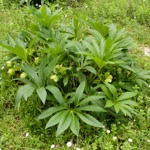Helleborus odorus ssp. cyclophyllus
Synon: H. cyclophyllus
Lenten rose Ελλέβορος

Ranunculaceae - buttercup family Dicot.
Helleborus odorus ssp. cyclophyllus
Synon: H. cyclophyllus
Lenten rose Ελλέβορος

Ranunculaceae - buttercup family Dicot.
Helleborus odorus is the wild Greek version of the hellebores grown in gardens throughout the world, known as christmas or lenten rose. The flowers are unusual as what appear to be petals are sepals and the true petals are modified to small structures which produce nectar, known as honey leaves. They flower early in the year and provide valuable sustenance to any honey bees which may be aroused from hibernation by warm days in late winter or early spring.
The bracts persist around the fruit pods and are surrounded by glossy bright green palmate leaves. New plants grow from seed or from the underground stems and may form large colonies. In Skopelos they are found exclusively in forest clearings.
Hellebores have been recognised from ancient times as a potent medicine and a poison; they were considered to have magical properties and used in religious rites. Dioscorides, the 1st Century physician recommended its use to expel phlegm, choler and bile. Its cathartic effect on goats was noted by Melampus (vide infra) and he used their milk to cure madness, and Melampodium is an alternative name for hellebores.
Helleborus from ελλέβορος , the ancient Greek name for the plant
from ellaei (έλλεΐ), - to injure + bora (βορά) - food or prey
odorus from latin for fragrant

The Ancient Myth of Melampus
Μελάμπους
Melampus a sooth-sayer and healer, as a youth, adopted two snakes after their mother had been killed and forbade the servants from destroying them. The two snakes in recompense for his kindness cleaned his ears while he was sleeping and in the process, gave him the gift of understanding the language of animals. On awakening he became aware that he could understand the voices of birds flying above.
As a healer he was renowned for treating the daughters of King Proteus, the Proetides. They had insulted the goddess Hera, who put a spell on them, making them go about the countryside pretending to be cows. He had noticed the cathartic effect on goats which fed on hellebores and gave the milk of these goats to the Proetides, curing them of their divine madness. Although Iphino, one of the women, died before she could be cured, Melampus went on to marry another, Iphiarina, and many of his descendants went on to become famous seers.

